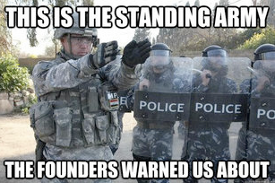The Founding Fathers Fought the Revolutionary War to Stop the Type of Militarized Police We Now Have In the U.S.

Founders Versus Ferguson …
Former Congressman – and Cleveland mayor – Dennis Kucinich wrote a must-read post yesterday:The Boston Massacre of March 5, 1770, was a catalyst toward the American Revolution. Five civilians were killed by the British soldiers. The Declaration of Independence, in condemning the offenses against liberty by George III, stated:Indeed, the top expert on the militarization of America’s police forces – Washington Post writer Radley Balko, who has testified to Congress and written books on the subject – confirms that the Founders would have seen the militarized police as an unconstitutional standing army:
He has kept among us, in times of peace, standing armies without the consent of our legislature.
He has affected to render the military independent of and superior to civil power.
He has combined with others to subject us to a jurisdiction foreign to our constitution, and unacknowledged by our laws; giving his assent to their acts of pretended legislation:
- For quartering large bodies of armed troops among us
- For protecting them, by mock trial, from punishment for any murders which they should commit on the inhabitants of these states
Balko starts with the provocative proposition that police as we know them in modern America are unconstitutional. “The Founders and their contemporaries would probably have seen even the early-nineteenth-century police forces as a standing army, and a particularly odious one at that,” Balko writes. “Just before the American Revolution, it wasn’t the stationing of British troops in the colonies that irked patriots in Boston and Virginia; it was the England’s decision to use the troops for everyday law enforcement.”In a post headlined, “Militarized Police: The Standing Army the Founders Warned About“, New American notes:
Balko links that decision to the oft forgotten Third Amendment, which forbids the quartering of troops in Americans’ homes against their will during peacetime. The Third Amendment is rarely litigated, and the Supreme Court has never heard a case primarily concerning the amendment, but Balko argues that it was included in the Bill of Rights out of a larger concern that a standing army could be used for the purposes of enforcing the law. “The actual quartering of British troops in the private homes of colonists was rare…It was the predictable fallout from positioning soldiers trained for warfare on city streets, among the civilian populace, and using them to enforce law and maintain order that enraged colonists.”
In an essay published in the Wall Street Journal last August, Radley Balko presented chilling and convincing evidence of the blurring of the line between cop and soldier:A Google search for the following phrase turns up over 250,000 hits, including articles from across the spectrum, such as Newsweek, Daily Kos, the American Conservative and Truth-Out:
Driven by martial rhetoric and the availability of military-style equipment — from bayonets and M-16 rifles to armored personnel carriers — American police forces have often adopted a mind-set previously reserved for the battlefield. The war on drugs and, more recently, post-9/11 antiterrorism efforts have created a new figure on the U.S. scene: the warrior cop — armed to the teeth, ready to deal harshly with targeted wrongdoers, and a growing threat to familiar American liberties.Balko rightly connects the menace of the martial police with the decline in liberty and a disintegration of legal boundaries between sheriffs and generals:
Americans have long been wary of using the military for domestic policing. Concerns about potential abuse date back to the creation of the Constitution, when the founders worried about standing armies and the intimidation of the people at large by an overzealous executive, who might choose to follow the unhappy precedents set by Europe’s emperors and monarchs.
“standing army” FergusonThe same search yields thousands of images. A comparison of photos of soldiers in war zones in Iraq and Afghanistan and police in Ferguson shows they are virtually indistinguishable.
Indeed:
Someone identifying himself as an 82nd Airborne Army veteran, observing the Ferguson police scene, comment[ed] that “We rolled lighter than that in an actual warzone” …(Background.)
Remember, the Founding Fathers repeatedly warned against standing armies.
Of course, it would be bad enough if the militarized police forces were only used in genuine emergencies. But Balko notes that the authorities have become “very antagonistic toward the very idea of free speech and the First Amendment“. And militarized swat teams are being used against people who commitcopyright infringement … or credit card fraud. They’re being used “for routine warrant service in … nonviolent crimes“.
And Balko notes:
SWAT teams today are overwhelmingly used to investigate people who are still only suspected of committing nonviolent consensual crimes.And Ellen Brown argues that the police are being militarized to protect of the financial elites:
When depositors cannot access their bank accounts to get money for food for the kids, they could well start breaking store windows and helping themselves. Worse, they might plot to overthrow the financier-controlled government. Witness Greece, where increasing disillusionment with the ability of the government to rescue the citizens from the worst depression since 1929 has precipitated riots and threats of violent overthrow.Postscript: The Founding Fathers also fought the Revolutionary War for other reasons, such as stopping:
Fear of that result could explain the massive, government-authorized spying on American citizens, the domestic use of drones, and the elimination of due process and of “posse comitatus” (the federal law prohibiting the military from enforcing “law and order” on non-federal property). Constitutional protections are being thrown out the window in favor of protecting the elite class in power.
- The type of spying which the NSA is doing
- The type of banking which the giant banks are practicing



No comments:
Post a Comment